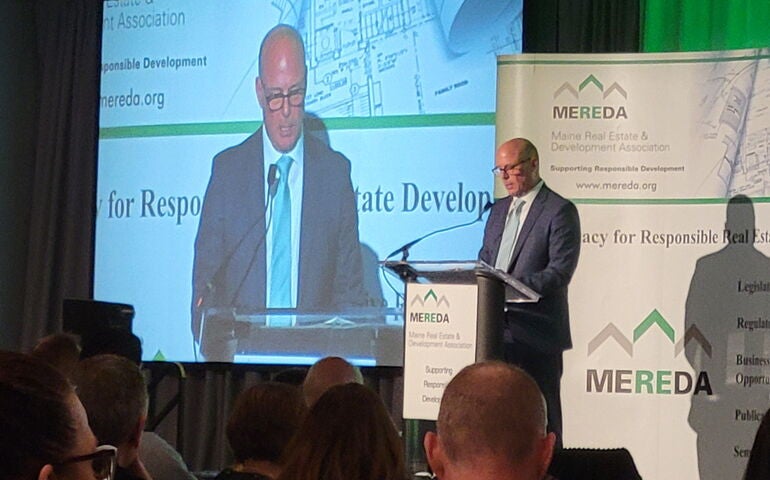MEREDA conference highlights notable projects, 'smart growth' and urban development
 Photo / Alison Nason
Craig Young, outgoing chair of MEREDA, addressing the audience at the May 15 MEREDA conference at the Holiday Inn by the Bay in Portland.
Photo / Alison Nason
Craig Young, outgoing chair of MEREDA, addressing the audience at the May 15 MEREDA conference at the Holiday Inn by the Bay in Portland.
The Maine Real Estate & Development Association's annual spring conference is always a major gathering spot to discuss real estate issues and offer networking for industry professionals.
This time the MEREDA conference, held Wednesday at the Holiday Inn by the Bay, spotlighted historic tax credits, "smart growth" initiatives and innovative urban development. MEREDA also presented its 2023 Notable Project Awards.
Wednesday's conference drew 300 people, Shelly Clark, the organization's executive director, told Mainebiz.
Craig Young, who is winding down his two-year term as MEREDA president, said in the opening remarks that affordable housing remains one of Maine's top priorities.
Young, who is a broker at Boulos Co., cited Gov. Janet Mills' comment that the "biggest impediment" to economic growth is the lack of affordable housing. He also referenced MaineHousing's call for 80,000 new units of housing in the next six years.
"We need affordable housing and just housing in general," Young said in his opening remarks. "With financing, politics and zoning, it's a complicated issue."
Here's an overview of Wednesday's conference.
Awards
MEREDA recognized its 2023 Notable Projects, seven in all:
- The Homeless Services Center in Portland, Developers Collaborative
- Northeastland Hotel in Presque Isle, Haley Ward Inc.
- Johnson Hall Opera House in Gardiner, Johnson Hall Redevelopment LLC
- The Armature at Hanover Works in Portland, Reveler Development
- Phoenix Flats in Portland, Community Housing of Maine
- Maine Savings Amphitheater in Bangor, Waterfront Concerts LLC.
- University of Southern Maine Portland Commons Residence Hall and McGoldrick Center for Career and Student Success in Portland, Capstone Development Partners.
Case studies from the South
Guest speaker Jonathan Tate, an architect in New Orleans and owner of OJT, offered an interesting look at some efforts to redevelop small, vacant parcels in the Louisiana city.
While there may have been some parallels to Portland, Tate did not make the comparisons. It was up to the audience to draw their own conclusions.
New Orleans has some historic areas that can be "rough around the edges," while still having high land prices. It is highly regulated. Neighborhoods may have their own version of NIMBY. And neighbors were often "afraid of density and design."
Tate's firm took the approach of filling "holes" in the city, "pieces or parts," developing small houses on small lots. In one case, OJT built a 975-square-foot home, including upper floor space, on a lot of of 880 square feet. (An acre is 43,560 square feet.)
In some cases, his firm was able to work with the city to modify zoning to allow more flexibility in developing small parcels.
Capitalizing on opportunity
In a panel, moderator Marieke Thormann, VP of development at Fathom Cos., helped shed light on how to leverage historic tax credits for major renovation projects. She was joined by John Egan of the Brunswick-based Genesis Fund; Jonathan Culley of Redfern Properties; and tax attorney Nate Marcet of Albin, Randall & Bennett.
There's a long list of successful historic renovations in Maine, including Fathom's renovation of the former Portland Press Herald building (now the Press Hotel), as well as the Grant Building in Bath, the Lemont Block in Brunswick and the remake of Lisbon High School, to name just a few.
Historic tax credits, which defray the expenses and help attract investors looking for tax incentives, are a crucial financing tool for many projects.
But, as the panel warned, it's a complicated process that, as Egan said, requires a team made up of the developer, accountants and attorneys.
Culley said the tax credits were a key part of the redevelopment of the former Mercy Hospital site, now the Nightingale apartment complex in Portland.
For the $65 million project, nearly a third of the financing, $20 million, came from historic tax credits.
With the credits, "investors ask for a lower rate of return. It can be a better deal than for a ground-up project," he said. "I've never seen a historic deal that could happen without the credit."
Economist perspective
In his economic roundup, Ken Entenmann, chief investment officer and chief economist at NBT Wealth Management, offered a mixed outlook for the economy, housing and labor.
"A year ago, the world was expecting a recession, and a year later, [we're] still expecting a recession," said Entenmann.
But the outlook has changed somewhat.
"We are returning to a normal environment," he added. "Rates are going to stay high, at least in the perspective of a few years ago."
Maine's housing shortage is still an issue. The housing market has struggled and mortgage rates remain a question mark.
"Home prices will continue to rise because we don't have the supply," said Entenmann. "People are still getting outbid way above the asking price."
To end his session, Entenmann said the labor force hasn't recovered to pre-pandemic numbers.
"It's not the greatest, but not the worst," said Entenmann.
Smart growth and urban development
The last session of the conference featured a panel discussion on smart growth and urban development, moderated by Jonathan Tate, principal of OJT. The panelists were Tyler Norod, Westbrook Development Corp., and Kevin Kraft and Nell Donaldson from the City of Portland.
They cited Portland's 2017 changes in building codes as a step in the right direction. There are signs the city is creating opportunities for housing development. The city is also looking to alleviate parking shortages, which would help residents, while encouraging walkable and accessible neighborhoods.













0 Comments